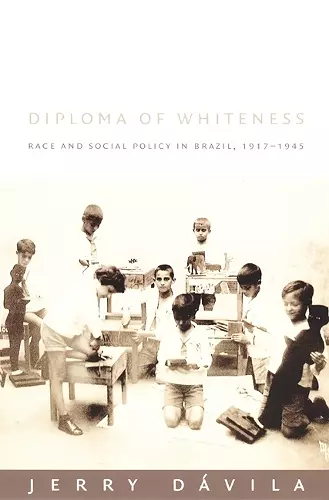Diploma of Whiteness
Race and Social Policy in Brazil, 1917–1945
Format:Hardback
Publisher:Duke University Press
Published:19th Mar '03
£89.00
Supplier delay - available to order, but may take longer than usual.

Asserts that Brazilian mid-century educational reforms, designed to end rigid, race-based exclusions and to incorporate the poor, did so by stressing whiteness as the primary characteristic of modernity
In Brazil, the country with the largest population of African descent in the Americas, the idea of race underwent a dramatic shift in the first half of the twentieth century. This title explores the significance of this transition by looking at the history of the Rio de Janeiro school system between 1917 and 1945.In Brazil, the country with the largest population of African descent in the Americas, the idea of race underwent a dramatic shift in the first half of the twentieth century. Brazilian authorities, who had considered race a biological fact, began to view it as a cultural and environmental condition. Jerry Dávila explores the significance of this transition by looking at the history of the Rio de Janeiro school system between 1917 and 1945. He demonstrates how, in the period between the world wars, the dramatic proliferation of social policy initiatives in Brazil was subtly but powerfully shaped by beliefs that racially mixed and nonwhite Brazilians could be symbolically, if not physically, whitened through changes in culture, habits, and health.
Providing a unique historical perspective on how racial attitudes move from elite discourse into people’s lives, Diploma of Whiteness shows how public schools promoted the idea that whites were inherently fit and those of African or mixed ancestry were necessarily in need of remedial attention. Analyzing primary material—including school system records, teacher journals, photographs, private letters, and unpublished documents—Dávila traces the emergence of racially coded hiring practices and student-tracking policies as well as the development of a social and scientific philosophy of eugenics. He contends that the implementation of the various policies intended to “improve” nonwhites institutionalized subtle barriers to their equitable integration into Brazilian society.
“A superbly researched analysis of the application of the whitening ideal, with all its contradictions, in the Rio de Janeiro schools during the interwar years.”—Thomas Skidmore, author of Black into White: Race and Nationality in Brazilian Thought
“By taking an innovative approach to the study of race and social policy, Jerry Dávila has written a rare book that shows how racial attitudes move from elite discourse into the real lives of real people. This approach combines with fascinating research and a narrative style that is compelling and often dramatic to make a first-rate contribution to the fields of Latin American and Brazilian history.”—Jeffrey Lesser, author of Negotiating National Identity: Immigrants, Minorities, and the Struggle for Ethnicity in Brazil
"Diploma of Whiteness is more than a history of Brazilian education. It provides a brilliant lesson that in order to analyze critically any educational system (and/or structure), knowledge of its past can be illuminating. Similarly, this text can elucidate how and why race remains a hidden force to be reckoned with in societies that are not only multiethnic/cultural, but are, in fact, fundamentally multiracial. Finally, this study of social reforms proves that the real measure of policy effectiveness should be sought in the lives of people: the human face of change and social equality." -- Francis Musa Boakari * Comparative Education Review *
"An illuminating contribution. . . . Diploma of Whiteness will be of special interest to those who study education, race, citizenship, and state building. It will make a fine addition to the books that are appropriate for upper-level undergraduate and graduate seminars on Brazilian and Latin American history." -- Peter M. Beattie * The Americas *
"A noteworthy book precisely because it strives to tackle the thorny set of methodological, analytical, and political issues that have clouded an assessment of the historic relationship between race and social policy in Brazil." -- Seth Garfield * American Historical Review *
"A timely work for current debates about affirmative action policies in Brazil, this study describes the long history of issues related to race, racism, and class in Brazil's education system. . . . Diploma of Whiteness is an interesting and clearly written book, appropriate for both graduate and undergraduate courses on Brazil and Latin America." -- Sarah Sarzynski * Hispanic American Historical Review *
"Dávila has achieved an important and laudable goal: his book is very well documented, presenting new archival data." -- Antonio Sérgio Alfredo Guimarães * Journal of Latin American Studies *
ISBN: 9780822330585
Dimensions: unknown
Weight: 771g
312 pages